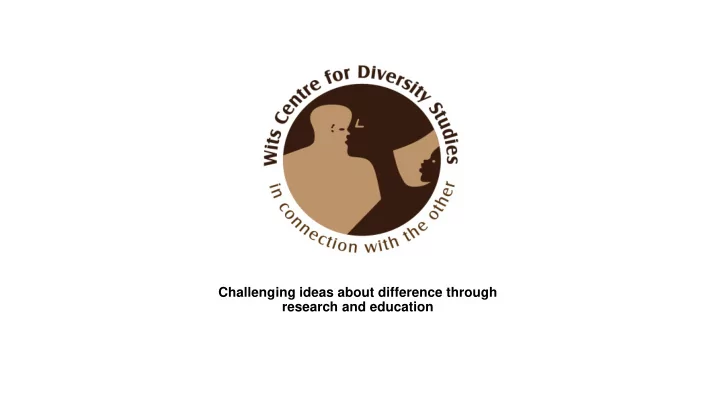

Challenging ideas about difference through research and education
Why “Literacy” ? • Once regarded as purely a matter of private, cognitive skills of encoding and decoding written texts • The “social turn” emphasised the social and cultural embeddedness of reading practices • The notion of literacy itself has opened out to include an expanded set of skills which are all seen as necessary for participation in contemporary society
Multiliteracies “Diversity, in fact, has become a paradoxical universal. The kind of person who can live well in this world is someone who has acquired the capacity to navigate from one domain of social activity to another, who is resilient in their capacity to articulate and enact their own identities and who can find ways of entering into dialogue with and learn new and unfamiliar social languages. One of the fundamental goals of a pedagogy of Multiliteracies is to create the conditions or learning which support the growth of this kind of person, a person comfortable with themselves as well as flexible enough to collaborate and negotiate with others who are different to themselves in order to forge a common interest.” (Cope and Kalantzis, 1998. p9)
Literacy and Diversity Literacy teaching is not about skills and competence; it is aimed a creating a kind of person, an active designer of meaning, with a sensibility open to differences, change and innovation. The logic of Multiliteracies is one which recognises that meaning making is an active, transformative process, and a pedagogy based on that recognition is more likely to open up viable lifecourses for a world of change and diversity. (p10)
“ Graduateness ” • Came into English System in 1990s • Qualities expect from graduate • Includes generic attributes • Capacity to deal with, in, through, complexity? • Package of literacies?
Racial Literacy – France Winddance Twine (2004) A “reading practice”— a way of perceiving and responding to the social climate and prevalent structures of oppression.
Critical Diversity Literacy (CDL) An informed analytical orientation that enables a person to read prevailing social relations as one would a text, recognising the ways in which possibilities are being opened up or closed down for those differently positioned within the unfolding dynamics of specific social contexts.
1 An understanding of the role of power in the construction of differences that make a difference
2 Recognition of the unequal symbolic and material value of different social locations. This includes acknowledging hegemonic positionalities and concomitant identities and how these position non- hegemonic others.
3 Analytical skills at unpacking how systems of of oppression intersect/interlock/co-constitute and co-construct each other; and how they are reproduced, resisted, and reframed.
4. A recognition of race, racism etc as current social problems, as well as, but not only, historical legacies.
5 Understanding social identities as the outcomes of social practices
6 The possession of a grammar and vocabulary that facilitates a discussion of privilege and oppression
7 The ability to translate ("see through") and interpret coded hegemonic practices.
8 An analysis of the ways in which diversity hierarchies and institutionalised oppressions are inflected through specific social contexts and material arrangements
9 Understanding the role of emotions, including our own emotional investments, in all of the above.
10 An engagement with transformation of these oppressive systems towards deepening social justice at all levels of social organization
Recommend
More recommend